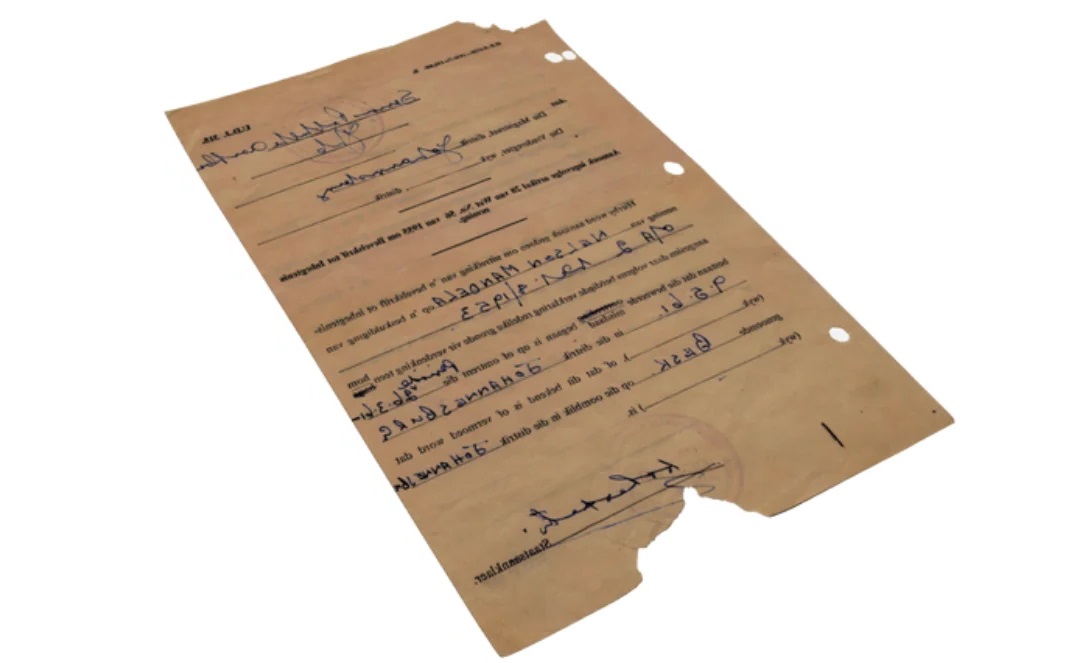A non-fungible token (NFT) developed from Nelson Mandela’s original arrest warrant has generated a record $130,000 in an auction. The motivation behind the auction was to help finance a heritage site that documents South Africa’s freedom struggle.
Mandela, the anti-apartheid activist who marched heroically out of prison after 27 years to become South Africa’s first black president, was arrested in 1962 for contriving to topple the white-minority administration.
He is a distinguished global icon, famous and popular for spearheading the end of South Africa’s apartheid policy in the 20th century. He was arrested and incarcerated for the same cause at Robben Island Prison for 18 years. His warrant of arrest, issued by a white magistrate in 1962, is a unique historic manuscript with global importance.
“I have fought against white domination, and I have fought against black domination. I have cherished the ideal of a democratic and free society in which all persons live together in harmony and with equal opportunities. It is an ideal which I hope to live for and to achieve. But if needs be, it is an ideal for which I am prepared to die,” the former South African President said in his speech from the Dock on 20th April 1964.
This world-exclusive NFT of the arrest warrant is a unique opportunity to own a piece of history whose value will only appreciate with time, and greatly. This is the first and only NFT of the arrest warrant issued anywhere in the world. The warrant was expertly scanned and designed by the team at Virtual Nation Builders (VNB).
Virtual Nation Builders is a company founded on the belief of harnessing the power of blockchain technology and connecting it to real communities to facilitate socio-economic development.
It is also the first official heritage NFT ever created in South Africa. The buyer of the warrant, whose details were not made public will be entitled to 5 percent of any subsequent sale in perpetuity. Thus, Mandela’s arrest warrant has the potential of being a perpetual money maker. Notwithstanding, the NFT has verifiable scarcity and possession that cannot be altered.
The warrant’s genuineness was verified by NFT auditors as a deep dive verified NFT. The NFT integrity officers are there to make sure that there is a direct line of communication between NFT auditors and the NFT holder, or their agent.
The officers respond to any questions either party may have, enable transfers and ensure protection of legal rights, assists in curating the NFT, assists in any further reports that may be required for on-sales among other things. These officers are Adam Cracker and Maurice Crespi.
Adam is the chief executive at IQbusiness, the biggest autonomous management and technology consulting company in South Africa. He joined IQbusiness in 2009 and became its honcho in 2010.
Maurice is a skilled legal practitioner with a great understanding of South African commercial, property, labour, tax and corporate law. He is an experienced and established prosecution attorney in both the Supreme Court of Appeal and Constitutional Court. He is presently learning Machine Learning at Stanford University, and Mixed Reality at the University of London.
The NFT’s owner now has the exclusive right to view the original physical warrant being held for safekeeping in a locker at Liliesleaf National Heritage Museum. Net proceeds go to the Liliesleaf National Heritage Museum. Liliesleaf is one of South Africa’s major national heritage sites.
Coincidentally, Liliesleaf has a rich connection to Nelson Mandela. On 11 July 1963, the police were tipped and ambushed on the then ANC headquarters and arrested the leaders of the ANC’s undercover freedom movement. Nelson Mandela and nine other people were arrested and charged with treason. Mandela would later be held in a prison on Robben Island.
Located 8km from South Africa’s mainland, Robben Island was a common stopping point for vessels in the 16th and early 17th centuries. At some points it was made to be a Dutch and a British colony, albeit at different times. It was fortified during World War II, and then was turned into a maximum security prison, from the mid-1960s to 1991.
It was a prison for mostly black men, who were imprisoned for their political causes, particularly for fighting against the infamous apartheid rule. This is where Nelson Mandela was imprisoned for the record 27 years, until 1990.
The last cohort of its prisoners were set free in 1991. Nonetheless, the island continued to serve as a medium-security prison for criminal culprits until 1996. In 1997 it was turned into a museum and declared a national memorial, and in 1999 it was designated as a World Heritage site.
Today, Liliesleaf is the custodian of incredible exhibitions that tell the tale of the long walk to freedom and democracy in South Africa. Proceeds from the sale will be channeled towards the Liliesleaf Museum Heritage Site. Liliesleaf received the original document in 2004 as a donation.
Seemingly, the national heritage has been struggling to meet its bills and to run normally. Last year the museum earned approximately $50,000 after an auction of a NFT of a pen gun that was owned by Mandela’s comrade in the freedom fight, Oliver Tambo.
Ahren Posthumus, the chief executive officer of Momint, the marketplace for NFTs that sold the Mandela item, observed that the proceeds of the auction will bolster the Museum financially.
Momint’s mantra highlights the value and importance of non-fungible tokens in promoting the artwork by technology: We believe that the true value of NFT’s is in the ability to irrefutably prove who created a piece of work online, and the history of ownership.
“The money will help the museum site stay afloat. They have been badly affected by the lack of tourism due to COVID. So this is a way to revitalize their flow and keep history alive,” Posthumus said in an interview.
A report by the United Nations Conference on Trade and Development that was released in 2021 estimated that Africa would lose between $170-253 billion.
In South Africa, lockdowns resulted in a 96% decline in tourist visits to national parks. This was approximated to equate to nearly 90% of tourism revenue, accentuating the fragility and risk of a sector that’s reliant on a single primary income stream. This also caused anxiety about health and job security among park staff. Mandela was acquited from jail in 1990 and the first multiracial election was held four years later.
The buyer of the NFT will have exclusive access to the original document at Liliesleaf Museum. “The ink is visible through the paper of the high-definition scan,” Posthumus said.
Non-fungible tokens have increased in popularity as a means of raising income, and preserving artists’ works. In recent years, months actually, caricatures of wild animals such as monkeys and lions have been auctioned off with prices in the millions of dollars.
Sports clubs, prestige automakers and even pop stars are among the people in the chase of the current NFT craze. This (NFT) trading model uses blockchain technology to verify unique ownership tokens attached to otherwise easily reproducible digital goods.
On May 3, 2014, Kevin McCoy, a digital artist, minted the first-known NFT “Quantum.” Quantum is a pixelated octagon made up of different patterns that pulse in a unique way. Fast forward to November 28th last year. An extraordinar Quantum art piece sold for over $1.4 million in a Sotheby auction.





